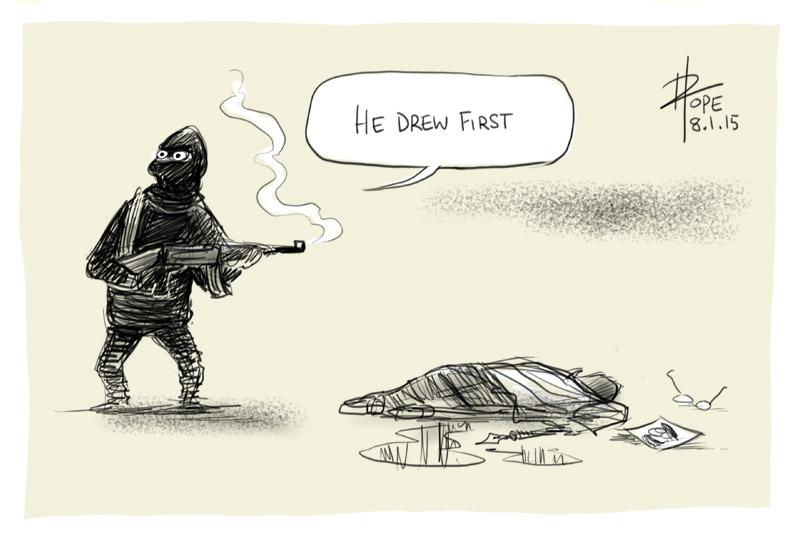
Cartoon by David Pope.
Earlier today three Islamic terrorists unleashed their fury at the personnel of Charlie Hebdo, an Onion-like French publication, gunning down 12 people, including two police officers. The main targets were the cartoonists at Charlie Hebdo who had drawn and published images of the so-called prophet Muhammad—a big no-no to radical Islamists, who have consistently over the last decade issued threats of violence, and on occasion committed violence against those who do so (including the 2011 firebombing of CH offices in 2011)—and have lampooned Islam more generally. After committing the heinous acts, the three assailants—eventually identified as Said Kouachi and Cherif Kouachi, both French, from Paris, and in their early 30s, and 18-year-old Hamyd Mourad, from Reims—escaped into a getaway car and were on the loose for hours. The latest report, according to Agence France-Presse, is that Mourad has surrendered to police; there are conflicting reports regarding the whereabouts of the other two terrorists.
Certainly, this was a sad day for the friends and families of the victims, for France, and for advocates of free speech and a liberal society worldwide. This attack was calculated and deliberate, not a haphazard or random act of violence. It was designed to assassinate people who freely wield the pen, who write or draw what they want—which is a hallmark of classical liberalism, as it is a key element of speaking truth to power structures, whether domestic or foreign. Of course, the killings weren’t only done to take out various Charlie Hebdo staff, but also to send a signal to other journalists—in France, in the West, around the globe—that they too are under threat if they don’t watch what they say about Islam. One of their goals is to place restraints on freedoms of speech by forcing journalists to self-censor their work, which shouldn’t be surprising.
After all, Islamic terrorists abhor freedom and democracy, believing they are human creations that place man, not God or Allah, at the center of politics and society. Since these terrorists don’t pose an existential threat to Western countries—yes, they can attack people and things, but can’t take over Western states and institutions—the next best thing is to hollow out Western institutions and ideals. Censorship—via foreign or domestic coercion—effectively enervates the foundations of liberal rights and freedoms, and by extension democracy itself as well.
It is interesting that this incident comes so soon after the fiasco involving “The Interview.” Different actors, different methods, of course, but a similar goal by the perpetrators in both cases. The North Korean hackers sought revenge over the content of the movie, which was all about the assassination of Kim Jong Un, and tried to leverage influence over the public release of the movie. At first, Sony caved in, canceling the public release, then, in response to American outcry, placed the movie online and held a limited Christmas-day release. But Sony’s later moves weren’t enough to compensate for the millions of dollars likely lost as a result of its initial cancellation; moreover, they sent a chilling message to bad guys around the world that it’s indeed possible to leverage a veto, even if only temporary, over what the U.S. does. So In effect, then, the North Koreans were successful in effecting a form of censorship on the U.S.
Unfortunately, immediately after the attacks, reports surfaced that CNN and the Associated Press, taking their cues from Sony, were reluctant to show images of the cartoons that were deemed incendiary by Islamic radicals and terrorists. Sure, these media outlets need to exercise caution because the security of their employees could be in jeopardy, depending on the decisions they make. Yet, at the same time, they have a responsibility to tell the full story of the attacks, and a part of that story is the work of the cartoonists—not just a description of their work, but the images, pictures of the actual cartoons. In fact, by showing the the cartoonists’ work, media sources can actually celebrate their lives as well as their liberal ideals—the right to create, to stimulate discussion, to provoke, to critique. But by exercising a degree of self-censorship, CNN and the AP are caving into the terrorists’ interests and demands. Sounds trite, yes, but it’s also true. Why should we value the interests and values of terrorists over those who embrace and reflect the best of humanity?
On the positive side, many posters on Facebook and Twitter have showed images of Charlie Hebdo cartoons. It’s this kind of resilience and spirit that keeps liberal values alive and well, and both will be needed to continue to fight the spread of the virulent strain of Islamic radicalism that exists today.

No comments:
Post a Comment